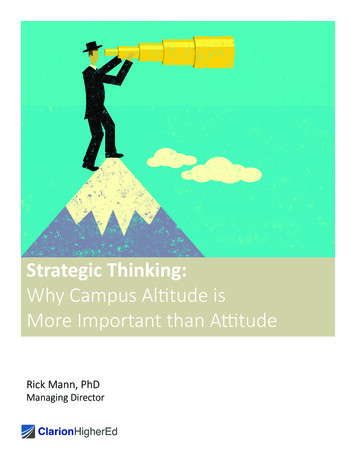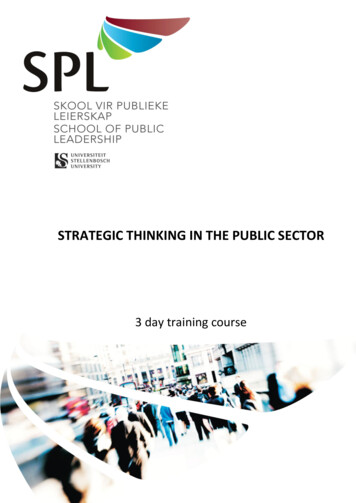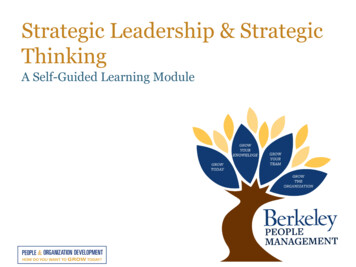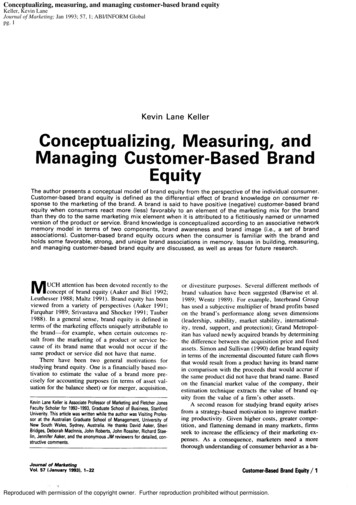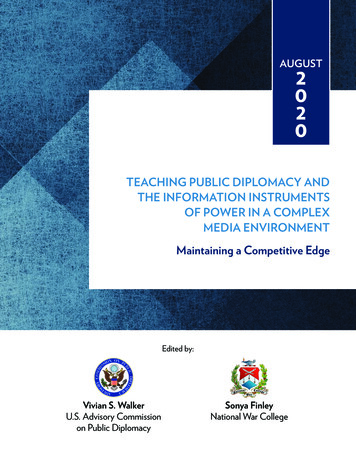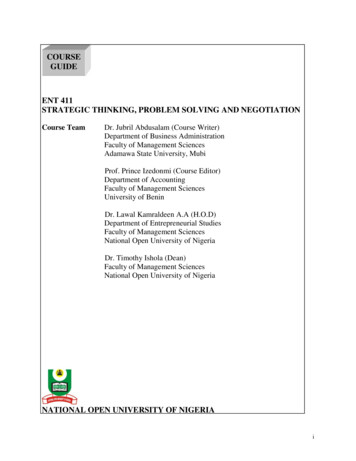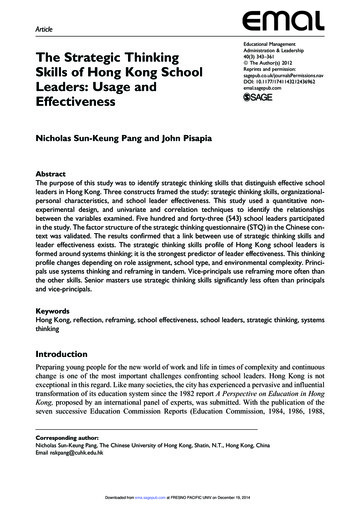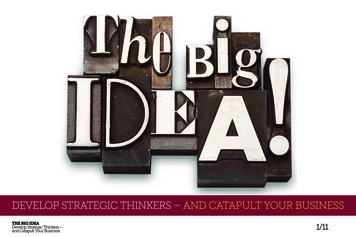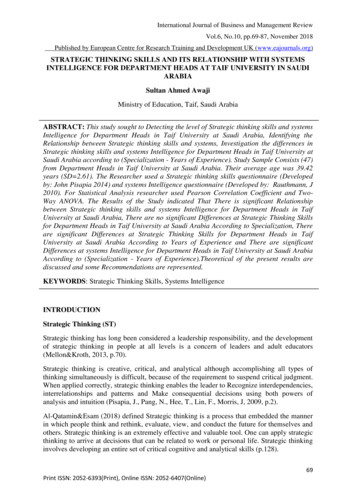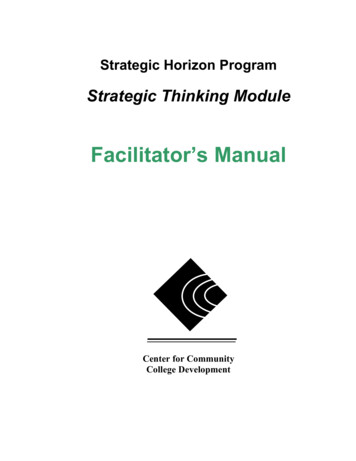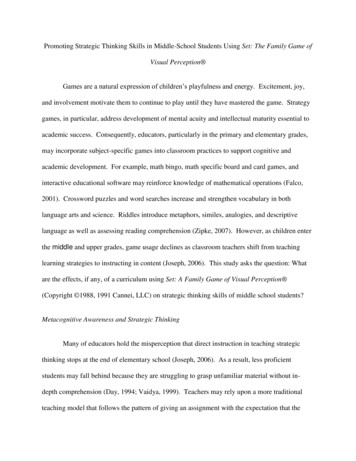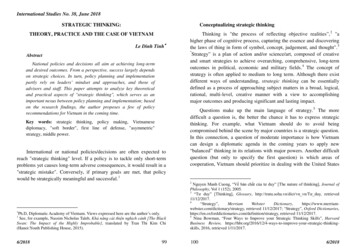
Transcription
International Studies No. 38, June 2018STRATEGIC THINKING:Conceptualizing strategic thinkingThinking is "the process of reflecting objective realities”, 2 "ahigher phase of cognitive process, capturing the essence and discoveringthe laws of thing in form of symbol, concept, judgement, and thought". 3“Strategy” is a plan of action and/or science/art, composed of creativeand smart strategies to achieve overarching, comprehensive, long-termoutcomes in political, economic and military fields. 4 The concept ofstrategy is often applied to medium to long term. Although there existdifferent ways of understanding, strategic thinking can be essentiallydefined as a process of approaching subject matters in a broad, logical,rational, multi-level, creative manner with a view to accomplishingmajor outcomes and producing significant and lasting impact.THEORY, PRACTICE AND THE CASE OF VIETNAMLe Dinh Tinh AbstractNational policies and decisions all aim at achieving long-termand desired outcomes. From a perspective, success largely dependson strategic choices. In turn, policy planning and implementationpartly rely on leaders’ mindset and approaches, and those ofadvisors and staff. This paper attempts to analyze key theoreticaland practical aspects of "strategic thinking", which serves as animportant nexus between policy planning and implementation; basedon the research findings, the author proposes a few of policyrecommendations for Vietnam in the coming time.Questions make up the main language of strategy. 5 The moredifficult a question is, the better the chance it has to express strategicthinking. For example, what Vietnam should do to avoid beingcompromised behind the scene by major countries is a strategic question.In this connection, a question of moderate importance is how Vietnamcan design a diplomatic agenda in the coming years to apply new“balanced” thinking in its relations with major powers. Another difficultquestion (but only to specify the first question) is which areas ofcooperation, Vietnam should prioritize in dealing with the United StatesKey words: strategic thinking, policy making, Vietnamesediplomacy, "soft border", first line of defense, "asymmetric"strategy, middle power.International or national policies/decisions are often expected toreach "strategic thinking" level. If a policy is to tackle only short-termproblems yet causes long-term adverse consequences, it would result in a"strategic mistake". Conversely, if primary goals are met, that policywould be strategically meaningful and successful. 1Nguyen Manh Cuong, “Về bản chất của tư duy” [The nature of thinking], Journal ofPhilosophy, Vol 1 (152), 2005.3“Tư duy” [Thinking], Glossary, http://tratu.soha.vn/dict/vn vn/Tư duy, ry/strategy, retrieved 11/12/2017; “Strategy”, Oxford inition/strategy, retrieved 11/12/2017.5Nina Bowman, “Four Ways to Improve your Strategic Thinking Skills”, HarvardBusiness Review, ategic-thinkingskills, 2016, retrieved 1/11/2017.2 Ph.D, Diplomatic Academy of Vietnam. Views expressed here are the author’s only.See, for example, Nassim Nicholas Taleb, Khả năng cải thiện nghịch cảnh [The BlackSwan: The Impact of the Highly Improbable], translated by Tran Thi Kim Chi(Hanoi:Youth Publishing House, 2015).16/20189911006/2018
International Studies No. 38, June 2018which dimension is prioritized among land, sea, sky and/or space. 10Modern concepts such as cyberspace, “soft border”, “off-shore defense,”and "deep defense" are also becoming increasingly popular. HistorianHalford Mackinder pointed to the land, while Alfred Mahan promotedsea power. Not putting the Eurasian continent at the epicenter, Mahannoted that the "geopolitical fate" of humankind depends on the Indianand Pacific oceans. Mahan advised countries to build up sea powers ofwhich navy should be to the fore. In a similar thought, Americanpolitical scientist Nicholas Spykman argued that geography represents adecisive factor for the American power in the sense that the country isfirst and foremost surrounded and protected by both the Atlantic andPacific Ocean. 11and China, with a view to neutralizing the possibility of beingcompromised. 6Strategic thinking helps us see "the big picture" and avoid beingconsumed by details. In other words, strategic thinking is the process ofobserving, explaining, and capturing key trends, laying out a vision thatencompasses fundamental aspects of strategic spheres in which oneshould take steps and mobilize forces to achieve primary, long-termgoals. The "case-by-case" approach is the anti-thesis of strategicthinking. For example, former US National Security Advisor ZbigniewBrzezinski advised US foreign policy planners to focus on the "grandchess board", concentrating resources on key geopolitical areas andmissions.7 Concurring with several other thinkers, Brzezinski believedthat after the Cold War, the United States somehow lost its direction andfell short of a "Grand Strategy" for the new era. American policy towardsinternational issues at that time was dominated by events without acoherent message. The United States was dragged into Iraq, and thenAfghanistan, and Pakistan, coupled with fighting terrorism and copingwith the rise of China at a time when its relative power graduallydeclined.According to Robert Kaplan, a geo-strategist, Indian and Chinesepolicy makers have studied Mahan's theory seriously. 12 Switching fromthe traditional focus on land, China is now building up its maritimepower as could be seen in its recent muscle flexing in the East China Seaand the East Sea. Lying on crucial maritime routes to both the MiddleEast and China, while having complex relations with Pakistan,Afghanistan in the north, Nepal, Bhutan and Bangladesh in the northeast,India has, in the course of history, attached greater importance tostrengthening maritime capacity, and in fact, possessed naval forces withconsiderable deterrent power. Recently, academics and policymakershave touted the role of Indo-Pacific geo-spatial connectivity. At the 2017APEC summit in Da Nang, the United States President Donald Trumpofficially announced this concept. Earlier, the India-US StrategicStrategic thinking is linked to geospatial vision. 8 Historian FrederickL. Schuman calls it "geo-strategic" thinking. 9 Geography plays a key rolein the security and development of nation states, the difference is just6For example, China is now proposing the Belt and Road Initiative, while the US isspearheading the Free and Open Indo-Pacific.7Zbigniew Brzezinski, The Grand Chessboard: American Primacy and Its GeostrategicImperatives, (New York: Barnes and Noble, 1997).8The concept of “geospatial space" actually depends on political decisions, forexample, without an incident Sri Lanka would have become a member of ASEAN;different specialized organizations also introduce different definitions of the AsiaPacific region.9Fredrick Schuman first used the term "geo-strategic" in 1942 in his article “Let UsLearn Our Geopolitics”, Current History, Vol. 2, (1942): 161-165.6/201810110See, for example, Robert Kaplan, The revenge of geography - What the map tells usabout coming conflicts and the battle against fate, (New York: Random House, 2012).11Nicholas J. Spykman, “Geography and Foreign Policy I”, The American PoliticalScience Review, Los Angeles (1938).12Robert Kaplan, The Revenge of Geography - What the Map tells us about comingconflicts and the battle against Fate, (New York: Random House, 2012): 110.21026/2018
International Studies No. 38, June 2018Dialogue in 2013 launched the Indo-Pacific Ocean Economic Corridorinitiative. In 2017, scholars K. Y Home R and Rajeev Chartuvedy coedited a paper titled "Emerging trans-regional corridors: South andSoutheast Asia", arguing that connecting the regional seas and oceans isindispensable for Asia's next stage of development. 13 From another pointof view, The Diplomat editor-in-chief Shannon Tiezzi assumes the IndoPacific strategy would form a counterweight to the "Belt and Road"initiative by China. 14currency such as Bitcoin, Ethereum and Zcash have challengedtraditional thinking about fiscal, monetary and banking management. 18Strategic space is measured not only at width but also in depth, suchas deep investment or deep defense. Another related concept is "softborder", which means borders of a country can extend to wherever itsideology, culture, and materials (e.g. goods, services) are present. On theone hand, the process of integration may undermine national sovereignty.On the other, it expands operational space. For example, individually,Southeast Asian countries are mostly modest economies; yet the ASEANEconomic Community as a whole is forecast to be the fifth largesteconomy in the world by 2020. 19Along with the maritime domain, cyberspace is becomingincreasingly consequential. Many countries have recently added thiscontent to their respective national security strategies. For example,China has set the goal to become a "cyberspace superpower." 15 In a 2012study, De Montfort University of Britain forecasted that cyberspace wasgoing to be even more important than physical spaces 16 while theEconomist calls it “the fifth domain”, along with land, sea, sky andspace. 17 In the economic sense, the emergence and spread of cryptoUnlike abstract thinking, strategic thinking is aligned with actionswith practical application as the main purpose in mind. This process thusrequires specific skills. According to the renowned economic strategistGlenn Ebersole, "strategic thinking is a very valuable and effective tool",and requires the following 11 skills: 20- The ability to use the left (logical) and right (creative) sides oftheir brain- Thinking with a strategic purpose as well as creating a visioningprocess13K. Y Home R and Rajeev Chartuvedy (Eds), Emerging Trans-regional Corridors:South and Southeast Asia, Observer Research Foundation, GP-ORF-Transregional-Corridors.pdf, retrieved 25/10/2017.14Shannon Tiezzi, “In Japan, Trump and Abe Offer Alternative to China’s ‘Belt andRoad’”, The Diplomat, 8/11/2017, abe-offer-alternative-to-chinas-belt-and-road/, retrieved 25/11/2017.15Paul Triolo and Graham Webster, China’s strategic thinking on building power incyberspace, a top Party journal’s timely explanation translated, New America,25/9/2017, erspace/, retrieved 30/10/2017.16See, for example, Cyberspace is More Important Than Land, Air or a-or-air-%E2%80%93-warns-dmu.aspx, retrieved 30/10/2017.17“War in the Fifth Domain” (2010), The Economist, 21/7/2010,http://www.economist.com/node/16478792, retrieved 31/10/2017.6/201810318See, for example, “The 8 biggest Bitcoin Players Who Could Make a Fortune off theCryptocurrency”, Time, 30/10/2017.19World Economic Forum, The ASEAN Economic Community: What You Need w/, 2016, retrieved 1/11/2017.20Glenn Ebersole, “Strategic Thinking: 11 Critical Skills Needed”, The Path cThinkingSkills,2017,retrieved1/11/2017.31046/2018
International Studies No. 38, June 2018- The ability to clearly define their objectives and develop astrategic action plan with each objective broken down into tasks and eachtask having a list of needed resources and a specific timelinecontains valuable points of reference such as strategic linkage, terraincontrol, decoy and real strike, knowing oneself, and wining withoutfighting.- The ability to design flexibility into their plans by creating somebenchmarks in their thinking to review progressIn short, to achieve "strategic thinking," planners need: (i) the abilityto identify and understand "the big picture", including key features andlongstanding trends in the imagined "geographic" space, which should bewide and deep enough; (ii) possess at least the aforementioned skills.The following section will examine the use of strategic thinking by anumber of small countries in formulating diplomatic, security anddevelopment strategy.- Great strategic thinkers will listen, hear and understand what issaid and will read and observe whatever they can so that they will havevery helpful and strategic information to guide them- Committed lifelong learners and learn from each of theirexperiences- Strategic thinkers take time out for themselves; their time outmay be in the form of a retreat, a special environmentStrategic thinking in practiceSingapore: "Small" but confident in its relations with major powers- Seek advice from othersWhat makes Singapore special is that its policy-makers often thinkoutside the box, which means thinking strategically against the coherentunfavorable realities of the country: small in area, poor in resources,modest in population, and communities and ethnic groups not sharing thesame history as other nations. Tapping into the pool of knowledgegenerated by its excellent advisors, subsequent Singaporean governmentshas set clear, consistent national objectives that honor principles and inthe meantime are practical (and pragmatic) with respect to its diplomaticrelations with big countries.- Strategic thinkers refer to themselves as realistic optimists- The ability to be non-judgmental; test the ideas afterthe"brainstorming" is concluded- The ability to be patient; Great ideas and thoughts require time todevelop.Likewise, expert Peter Walsh of the Harvard Business andAdministration defines policy-makers with strategic thinking are thosewho look to the future, keep learning, have long-term visions, take riskswith new methodologies, understand priorities, and make flexible andcreative moves. 21 In terms of skills, various works since ancient timeshave proven worth reading such as Sun Tzu’s The Art of War whichIn early July 2017, a remarkable debate took place in the country.One camp was represented by Ambassador Bilahari Kausikan (formerSecretary of State for Foreign Affairs, Singapore ASEANSOM leader)and Minister of Justice K Shanmugam (formerly Foreign Minister). Theother camp had Dean of the Lee Kuan Yew School of Public PolicyMahbubani Kishore and Ambassador Mr. Ong Keng Ong (formerSecretary General of ASEAN). They are all Singaporean diplomats,21Peter Walsh, “Are You a Strategic Thinker? Test yourself”, Harvard Business,20/5/2014, gic-thinker-test-yourself,2014, retrieved 11/12/2017.6/201810541066/2018
International Studies No. 38, June 2018politicians, and thinkers offering their opinions on how Singapore shouldbehave in the international arena in the "post-Lee Kuan Yew" era.although the region and the world have undergone various turmoil,Singapore is still able to maintain healthy relationships with all majorcountries, thus ensuring its security and status goals.Kishore kicked off the debate in the Straits Times, suggesting thatSingapore should follow the governing principles of geopolitics, that is,"small states must always behave like small states"; Singapore is nolonger in the position as it was in the time of Lee Kuan Yew, and thus,needs to change the behavior in its dealing with big countries (see the"optimistic but realistic" characteristics of strategic thinking proposed byGlenn Ebersole). Bilahari dismissed this line of thinking, dubbing it a"dangerous mistake", arguing that it will place Singapore in a situationwhere it will be dominated by big nations. 22 Shanmugam supportedBilahari's view, adding that when the country has to be "flexible", it mustalways be "flexible". The Kishore supporters maintain that adoptinggeopolitically-driven principles is not the same as Singapore changing itsposition and foreign policy; it is just a warning that from now onSingapore needs to be more cautious with what it might choose from thepolicy menu, and it should not show too much ambition in “theMachiavellian world”; 23 but this does not necessarily mean thatSingapore has to always “kowtow” big countries. 24In the economic term, from the 1960s to the 1970s, Singapore tookadvantage of its location alongside strategic coastal chokepoints topromote a boom in international trade and transportation, allowingcapital flows, new technologies and effective management tools tospread to the island. Propelled by dynamism and creativity, the vision ofSingapore also includes elements like maximizing its vantage point inthe Strait of Malacca, where 40% of the world goods passes by (strategicthinking about enlarging operational space); prioritizing trade andinternational investment to amplify interests intertwined with externalpartners and to promote domestic growth; building up a lean andeffective government (strategic thinking about smart steps and effectiveorganization). 25 Other solid foundations are meritocracy, honesty andpragmatism. 26Israel: Off-shore defense in response to security challengesNeo-realists John Measheirmer and Stephen Walt argue that afterthe end of the Cold War, despite the significance and the special tielobbied by the American Jewish community, Israel is still regarded as a"strategic liability" to the United States, first and foremost due to thecomplex relationship of the Jewish state with many neighboring Muslimcountries. 27 From being a close ally, the United States who beganThis debate shows that Singapore, as a successful island state, theonly developed country in ASEAN, is always looking for new strategiccontours (constantly exploring new directions and having an exit strategyis the quality and skill expected of strategists). In fact, until now,2225“Roles of Small States: Bilahari’s Criticism of Kishore ‘Wrong and ng-misleading, 2017, retrieved 19/8/2017.23Nicolo Machiavellia (1469-1527), Italian thinker, who is considered to be a foundingfather of realism in international relations, warns that countries tend to achieve theirgoals by all means; that political power and pragmatism play a critical role. NicoloMachiavellia, The Prince, (Dante: University of America Press, 2003).24Ibid.6/2018107“Why Singapore Became an Economic Success”, The Economist, t-explains/2015/03/economist-explains-23,2015, retrieved 25/7/2017.26Kishore Mahbubani, “Why Singapore is the World’s Most Successful Society”,Huffington Post, ngapore-worldsuccessful-society b 7934988.html, 2015, retrieved 25/7/2017.27John Measheirmer and Stephen Walt, The Israel Lobby and US Foreign Policy, (NewYork: Farrar, Straus and Giroux, 2008): 15.51086/2018
International Studies No. 38, June 2018showing signs of loosening the alliance now put Israel in a unexpectedsecurity situation.technology defense capabilities and significant deterrence powers fromwithin.In order to reverse the course, Israel applied strategic thinking in away that put diplomacy one step ahead of other measures, creating an"off-shore defense" strategy. Through the pro-active lobbying role by theAmerican Jewish Committee (AJC) as well as the wider AmericanJewish community, only after a short period of time, Israel was able toremove the United States thinking that the former was a "burden" or astrategic liability for the latter. In contrast, by 2016, the United Statestotal aid to Israel exceeded US 150 billion, mostly non-refundable. Thelobbying process focused not only on key policy-making agencies suchas the Congress, the Administration, but also on the American publicaudience. Israel persuaded Americans that if the United Statescooperated, the gains would be greater than diverting Israel, for instance,in solving the Middle East problems. Thanks to the "lobbying"investments, American public opinion become more favored of Israelthrough the role of media influencers such as Martin Peretz, MortimerZuckerman, William Safire, A.M. Rosenthal and David Brooks.American well-known academics such as Jim Hoagland, Robert Kagan,Charles Krauthammer, Max Boot and George Will regularly producepro-Israel posts. Numerous newspapers side with Israel likeCommentary, New Republic and Weekly Standard. A pro-Israel solutionhas always received support from both Democrats and Republicans.Instead of waiting for the judgment day and not knowing what theoutcome might be due a larger partner’s fluctuating behavior at a criticaljuncture, Israel opted for a forward-thinking approach (appropriatevisions and steps), combining indigenous deterrence capabilities with"off-shore defense" (strategic thinking about expansion of defensespace). From the skill perspective, as advised by Glenn Ebersole, Israelis successful because it always sets clear goals to be realized by specificplans of actions and adequately allocated resources. 28 Lobbyingagencies, groups, and individuals that influence the United States policyhelped Israel create an extra layer shielding its security and foreignpolicy interests. 29Poland: Success comes from agility and steps in the right directionDiplomatically, Poland has always had a seat at the table once thereis an international situation that it thinks the country can get involved.For example, Poland was one of the three member countries of theInternational Commission for Supervision and Control in Viet Nam(ICC), established under the 1954 Geneva Accords and the 1973 ParisPeace Accords. Being agile to shifting situations and having foresight,Polish diplomacy has enabled this country to play a considerable role inthe European and world affairs; particularly, Poland is one of thefounding members of the United Nations and is now a member of allmajor international and regional organizations and institutions such asOperating regularly on multiple channels and levels ofcommunication (strategic thinking in problem-solving), the AJC and theIsraeli government repeatedly hired companies, media outlets, advisorygroups and influencers to work on their behalf. Not only in the UnitedStates, Israeli diplomatic missions in other countries are also particularlyactive in connecting and commiserating with the host country. Togetherwith the United State security umbrella, Israel is said to develop high6/201810928This is to assess only a few aspects of the Israeli diplomacy success from theperspective of Israel. That the United States increased relations with Israel also incitedanti-Americanism in many Arab countries and complicating relations between Israeland these countries. John Measheirmer and Stephen Walt, The Israel Lobby and USForeign Policy (New York: Farrar, Straus and Giroux, 2008): 333.29There is no discussion of "right or wrong" here but rather the aspect of effectivenessof Israel's strategy.61106/2018
International Studies No. 38, June 2018the WTO, the EU, NATO, OECD, and OSCE. 30 Looking at “the bigpicture", taking Europe, even the world as the strategically operationalspace, Poland forges close and dynamic economic and securitypartnership with many countries, organizations and regions to obtainpivotal positions, while at the same time managing the sensitiverelationships with two giant neighbors Russia and Germany, not lettingthese two countries pose direct security challenges. 31Poland's diplomatic and economic success stems from big thinking,effective use of strategic spaces, and consistent application of goldenprinciples in management. Ample evidence of the success recipe basedon high quality human resources and pockets of excellence is that Polandhas so far had 15 Nobel Prize winners in different fields.In sum, from a strategic thinking perspective, the commondenominators of success strategies by Singapore, Israel and Poland are asfollows:Economically, by 2016, Poland's GDP per capita denominated inpurchasing power parity reached US 25,000, in the top of 65% of highincome countries in Europe. For the past 20 years, Poland's growth hasalways been the highest in absolute and relative terms compared to otherEuropean countries. Poland was the only European country recordingpositive growth during the 2008-2009 global economic recession. Take alook at its conditions: an energy net import country with limited naturalresources and a low starting point. Explaining this phenomenon, severalstudies suggest that Poland has pushed forward its development coursevia a deep integration scheme in Europe; making education reform a toppriority (now the level has exceeded the European median standard);creating a business environment conducive for domestic and foreignenterprises (according to the World Bank, Poland ranks first on thiscriterion in the OECD and EU); reforming markets along with strictscrutiny of essential sectors such as banking and public debt. 32- Being able to identify strategic spaces both at width and in depth.- Creating enduring cooperative values in diplomacy andeconomics with partners; implementing "asymmetrical" strategy; despitebeing small in scale, a country is still able to produce enough selfdefense capabilities by a long-term vision and efficient organization offorces.- Being flexible, and adaptive to changing circumstances.Issues for VietnamSince the adoption of renovative thinking in 1986, Vietnam hasachieved a number of historic successes in terms of socio-economics,security, national defense and diplomacy, promoting national interestsand earning worldwide appraisal. 33 Economically, according to theWorld Bank, since 1990, Vietnam has been among the fastest growingeconomies in GDP per capita, recording an average of 6.4% per year inthe 2000s. [ ] Growth has been equally distributed, poverty sharplydeclined, and social welfare significantly improved. [.] Over the pasttwo decades, more than 40 million Vietnamese have been lifted out ofMagdalena Rosińska-Bukowska, Józef Bukowski, Poland in InternationalOrganizations, http://www.instytutgm.uni.lodz.pl/wgrane is-wesja-do-publikacji.pdf, 2010, retrieved 25/8/2017.31Germany supported Poland to join NATO and the EU; The relations between Polandand Russia have some tensions, but the framework is kept for many reasons, includingeconomic cooperation.32Marcin Piatkowski, “How Poland became Europe’s Growth Champion: Insight tsfrom-the-successful-post-socialist-transition/, 2015, retrieved 25/8/2017.306/201811133In this section, the article does not intend to list all the achievements and challenges,rather cite sufficient supporting evidences.71126/2018
International Studies No. 38, June 2018poverty. Yet Vietnam also faces many difficulties and challenges.Currently, Vietnam remains in the low middle income country groupwhile one study shows that since 1960, just 16 out of 100 countries havebeen able to escape the middle income trap. 34 Vietnam's GDP per capitain 2014 reached US 2,052 USD, twenty one times that of 1990, but justequal to Malaysia in 1998, Thailand in 1993, Indonesia in 2008, thePhilippines in 2010; Vietnam is 30-35 years behind South Korea, 25years behind Thailand, 5-7 years behind Indonesia and the Philippines. 35Success is coupled with challenges. The international environmentalways undergoes fast, complex and unpredictable changes, such as thecurrent protectionist trend, anti-globalization, and unexpected policydecisions. 37 The expansive phase of relationship has basically completedbut the deepening one will be more difficult due to a higher demand ofintertwined interests, values, and policy coordination between partners. Thelesson of maintaining independence and self-reliance in decision-makingprocess, keeping the balance, avoiding “leaning on one side" needs to bekept in mind due to the complex nature, roles and ties among the majorpowers. The world has supporters of idealism and justice, but there are alsoultra-pragmatic forces pursuing hegemony and narrow national interests.The diplomatic enterprise is getting increasingly sophisticated due to theinterdependent and omni-dimensional linkages between actors, and thespread of cross-border issues. It is because of that awareness, at the 29thDiplomatic Conference held in August 2016, Prime Minister Nguyen XuanPhuc emphasized the need to launch a new strategic thinking for the newera.With regard to external relations, together with safeguarding apeaceful, stable environment, Vietnam diplomacy continues to expand anddeepen, making practical contributions to national security, development,and image-building. In recent history, Vietnam has also been particularlysuccessful in applying strategic thinking which can be inherited and learnedfor the next stage of development:(i) The peace negotiating process leading to the end of the war;(ii) The lifting of blockade and embargo;(iii) The innovation, opening up, international integration process (ongoing).36In terms of security and national defense, a general assessment atthis stage is, "resolutely, persistently struggling to firmly defendindependence, sovereignty, unity and territorial integrity of theFatherland, maintain peace and stability for the development of thecountry"; 38 evolving from "military thinking” to “defense thinking",34“The Middle-income Trap has Little Evidence Going for It”, The Economist, can-hold-their-own-against-rivals-both, 2017, retrieved 9/10/2017. However,
Unlike abstract thinking, strategic thinking is aligned with actions with practical application as the main purpose in mind. This process thus requires specific skills. According to the renowned economic strategist Glenn Ebersole, "strategic thinking is a very valuable and effective tool", and requires the following 11 skills: 20
